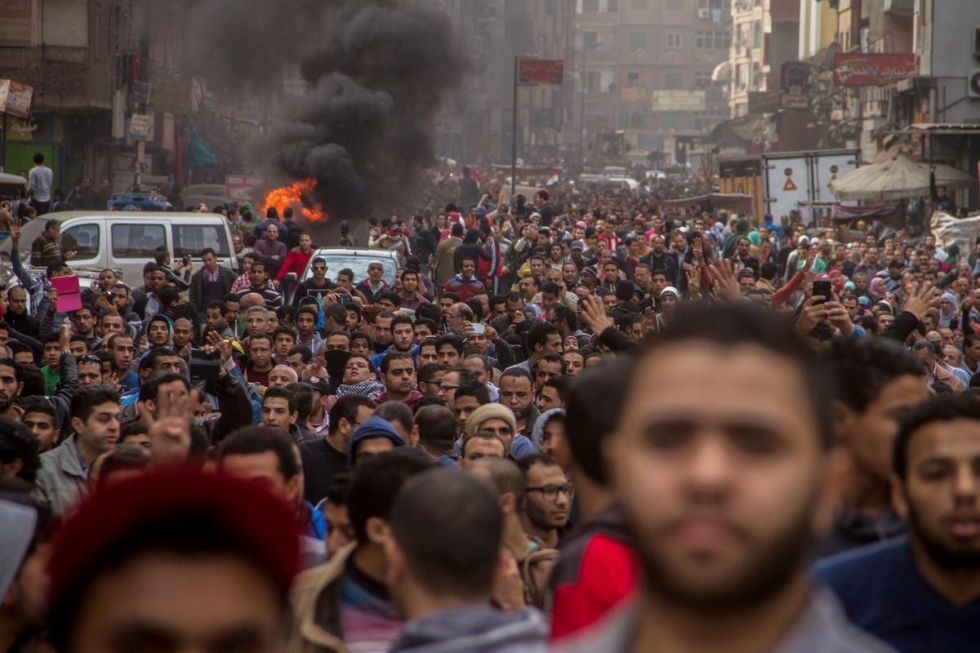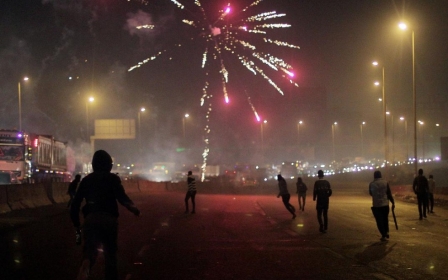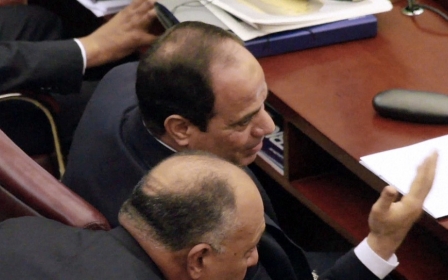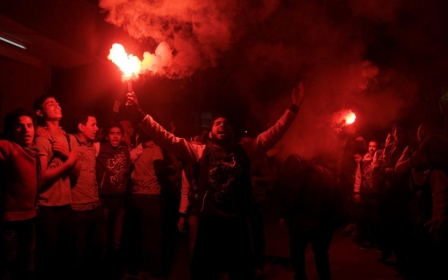Egypt marks revolt anniversary with bombs, bloodshed

At least 16 people, including one policemen were killed in unrest in Egypt on Sunday as the country marked the fourth anniversary of its 2011 uprising, according to sources.
Eleven protesters were killed in clashes in the north Cairo neighbourhoods of Matareya, Ain Shams and Haram, and another in the Mediterranean city of Alexandria, a health ministry official told AFP.
The interior ministry said protesters shot dead a police conscript in the north Cairo clashes. A security source, who asked to remain anonymous, said unidentified gunmen opened fire on a police patrol car on a highway south of Cairo, killing two conscripts. Later reports said those conscripts were only wounded.
In central Cairo, police fired shotguns and tear gas to disperse hundreds of protesters who tried to march on Tahrir Square, the epicentre of the early 2011 revolt that ousted veteran autocrat Hosni Mubarak.
Hours earlier, two militants mistakenly blew up themselves as they tried to sabotage an electricity tower in the Nile Delta, and a policeman was wounded in a small bomb blast in the capital.
Militant group Ajnad Misr, or Soldiers of Egypt, claimed responsibility for the bomb blast.
Authorities had tightened security in Cairo and other cities after activists called for protests against the government of President Abdel Fattah al-Sisi, the former army chief who ousted Egypt's first freely elected president Mohamed Morsi in July 2013.
The militants – who are critical of both Morsi and Sisi - have regularly targeted security forces since Morsi's ouster, killing scores of policemen and soldiers.
Egypt's Muslim Brotherhood movement said on Sunday that it had organized 230 protests across the country to mark the 25 January uprising.
"Breaking the military coup's grip is only a matter of time," newly-appointed Brotherhood spokesman Mohamed Montasser said in an audio clip broadcast on the pro-Brotherhood Masr Al-An (Egypt Now) TV, which is based outside Egypt.
The BBC's Orla Guerin, reporting from Ain Shams, said plain-clothed police officers had told the press team that they would be shot if they filmed in the area.
Egyptian security forces had closed off Tahrir Square late on Saturday - which has turned into a no-go zone for demonstrators – blocking its entrances with barbed wire and armoured vehicles.
Tensions have been running high ahead of Sunday's anniversary, and a female demonstrator was killed in clashes with police during a leftwing protest in central Cairo on Saturday.
Shaima al-Sabbagh, who was 34 and the mother of a five-year-old boy, died of birdshot wounds, a health ministry spokesman said.
Fellow protesters said she was hit by birdshot when police fired to disperse the march. The prosecutor has now launched a probe into her death, but deny that she was killed by security forces.
Hundreds took to the streets of her home town of Alexandria on Sunday to take part in a huge funeral procession.
A 17-year-old female protester, Sondos Reda Abu Bakr, was also killed on Friday in clashes in Alexandria.
Prime Minister Ibrahim Mahlab said Sabbagh's death was being investigated and vowed that "whoever committed a mistake will be punished, whoever he may be."
A senior interior ministry official denied police had used birdshot to disperse the protest.
"No weapons such as birdshot or rubber bullets were used, it was a small protest that did not require the use of such weapons," an aide to the interior minister, Abdel Fattah Osman, told AFP.
"Only two tear gas canisters were fired."
The clash took place hours before state television aired a pre-recorded speech by President Abdel Fattah al-Sisi to mark the fourth anniversary of the popular uprising.
"I salute all our martyrs, from the beginning of January 25 (2011) until now," said Sisi.
The speech appears to have been taped in the presidential palace before Sisi left for Saudi Arabia to offer his condolences over the death of King Abdullah.
Police have warned they would "decisively" confront protests on Sunday. Morsi's supporters often hold rallies that police disperse.
The revolt against Mubarak erupted on January 25, 2011, with hundreds of thousands of protesters taking to the streets across Egypt for 18 days until he stepped down.
The anti-Mubarak revolt was fuelled by police abuses and the corruption of the strongman's three-decade rule.
Activists, including those who spearheaded the anti-Mubarak revolt, have accused Sisi of reviving aspects of the former autocrat's rule.
The uprising's anniversary comes just days after a court ordered the release of Mubarak's two sons, Gamal and Alaa, pending a corruption retrial along with their father.
Another court had dismissed charges against the elder Mubarak over the deaths of protesters during the 18-day uprising against him.
Egypt's Muslim Brotherhood movement on Saturday named Montasser its new spokesman, the first since Morsi's ouster. It said in a statement on its website that the new spokesman would be responsible for expressing the point of view of the movement regarding all issues.
Middle East Eye propose une couverture et une analyse indépendantes et incomparables du Moyen-Orient, de l’Afrique du Nord et d’autres régions du monde. Pour en savoir plus sur la reprise de ce contenu et les frais qui s’appliquent, veuillez remplir ce formulaire [en anglais]. Pour en savoir plus sur MEE, cliquez ici [en anglais].




